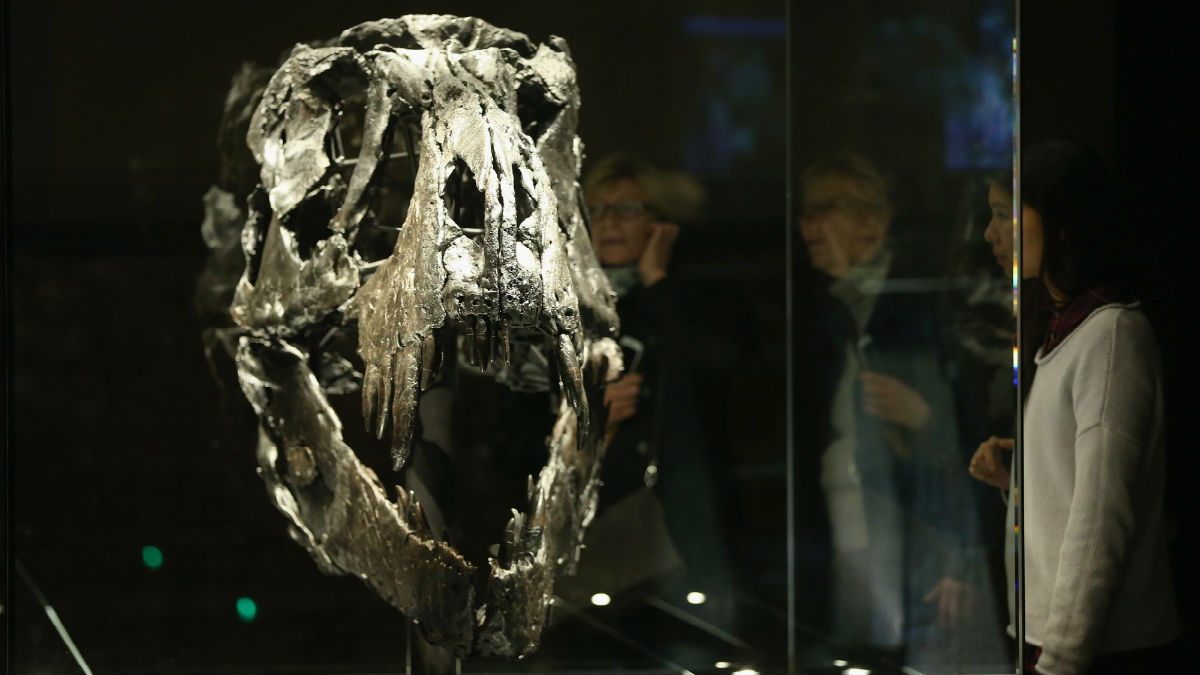T-rex's brainy ancestor discovered in Uzbekistan
Skull helps show how the giant dinosaur rose to such a dominant position in the food chain

A free daily email with the biggest news stories of the day – and the best features from TheWeek.com
You are now subscribed
Your newsletter sign-up was successful
A skull belonging to an ancestor of the Tyrannosaurus rex has been unearthed in Uzbekistan, shedding light on how the dinosaur came to be one of the most fearsome predators to walk the earth.
The remains of the horse-sized creature, named Timurlengia euotica, reveal it had an advanced brain and hearing system, which may hold the key to understanding how the T-rex rose to such a dominant position in the food chain.
It was discovered by researchers from the University of Edinburgh, along with colleagues from the US and Russia.
The Week
Escape your echo chamber. Get the facts behind the news, plus analysis from multiple perspectives.

Sign up for The Week's Free Newsletters
From our morning news briefing to a weekly Good News Newsletter, get the best of The Week delivered directly to your inbox.
From our morning news briefing to a weekly Good News Newsletter, get the best of The Week delivered directly to your inbox.
"We have a totally new species of dinosaur," lead researcher Dr Stephen Brusatte told the BBC. "It's one of the very closest cousins of T-rex, but a lot smaller – about the size of a horse - and it comes from the middle part of the Cretaceous period, a point where we have a huge gap in the fossil record."
Timurlengia is thought to have lived approximately 90 million years ago, was probably covered in feathers, grew to a maximum size of around nine feet and weighed about 600lbs. By comparison, T-rex grew to about 40ft in length and weighed up to seven tons.
"The braincase and inner ear indicate that the small carnivore had a keen sense of hearing and excellent eyesight that would characterise the giant tyrannosaurs that came later," the Smithsonian magazine says.
The find adds to scientists' understanding of dinosaur development, suggesting "that T-rex and its closest relatives did not develop their heightened senses after reaching gigantic proportions, but instead beefed up later on", says The Guardian.
A free daily email with the biggest news stories of the day – and the best features from TheWeek.com
-
 Local elections 2026: where are they and who is expected to win?
Local elections 2026: where are they and who is expected to win?The Explainer Labour is braced for heavy losses and U-turn on postponing some council elections hasn’t helped the party’s prospects
-
 6 of the world’s most accessible destinations
6 of the world’s most accessible destinationsThe Week Recommends Experience all of Berlin, Singapore and Sydney
-
 How the FCC’s ‘equal time’ rule works
How the FCC’s ‘equal time’ rule worksIn the Spotlight The law is at the heart of the Colbert-CBS conflict
-
 Epstein files topple law CEO, roil UK government
Epstein files topple law CEO, roil UK governmentSpeed Read Peter Mandelson, Britain’s former ambassador to the US, is caught up in the scandal
-
 Iran and US prepare to meet after skirmishes
Iran and US prepare to meet after skirmishesSpeed Read The incident comes amid heightened tensions in the Middle East
-
 Israel retrieves final hostage’s body from Gaza
Israel retrieves final hostage’s body from GazaSpeed Read The 24-year-old police officer was killed during the initial Hamas attack
-
 China’s Xi targets top general in growing purge
China’s Xi targets top general in growing purgeSpeed Read Zhang Youxia is being investigated over ‘grave violations’ of the law
-
 Panama and Canada are negotiating over a crucial copper mine
Panama and Canada are negotiating over a crucial copper mineIn the Spotlight Panama is set to make a final decision on the mine this summer
-
 Why Greenland’s natural resources are nearly impossible to mine
Why Greenland’s natural resources are nearly impossible to mineThe Explainer The country’s natural landscape makes the task extremely difficult
-
 Iran cuts internet as protests escalate
Iran cuts internet as protests escalateSpeed Reada Government buildings across the country have been set on fire
-
 US nabs ‘shadow’ tanker claimed by Russia
US nabs ‘shadow’ tanker claimed by RussiaSpeed Read The ship was one of two vessels seized by the US military